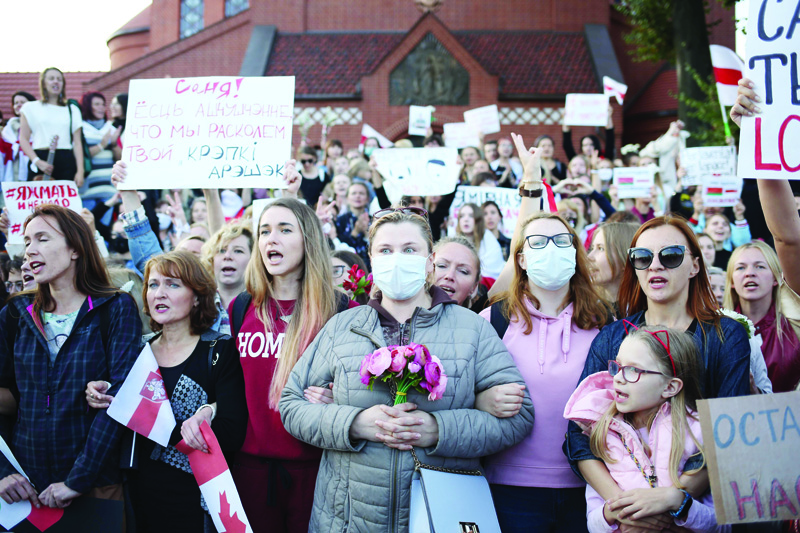
MINSK: Belarusian protesters yesterday prepared a new mass demonstration against strongman Alexander Lukashenko who has refused to quit after a disputed re-election and turned to Russia for help. Unprecedented protests broke out in the ex-Soviet country after Lukashenko, who has ruled the ex-Soviet state for 26 years, claimed re-election with 80 percent of the vote on August 9. Opposition rival Svetlana Tikhanovskaya says she has won the vote but Lukashenko's security forces have detained thousands of protesters, many of whom accused police of beatings and torture.
Several people have died in the crackdown but Belarusians have been demonstrating across the country for nearly a month, with more than 100,000 people flooding the streets of the capital Minsk for three straight weekends. Dozens of people including student protesters and journalists covering rallies were detained this week. On Saturday, around 4,000 people took to the streets and more than 90 people were detained, the interior ministry said.
'Strong when united'
Tikhanovskaya, a 37-year-old political novice, urged supporters to turn up for yesterday's "March of Unity" set to begin at 1100 GMT. "Remember we are strong as long as we are united," she said in a short video address. Tikhanovskaya contested the election after her blogger husband was jailed and barred from running along with several other prominent Lukashenko critics.
She left Belarus under pressure from authorities and took shelter in EU member Lithuania. On Friday, Tikhanovskaya addressed a meeting of the UN Security Council by video link, calling for sanctions against those responsible for the alleged electoral fraud and rights violations. The Baltic nations of Lithuania, Latvia and Estonia have blacklisted Lukashenko and 29 high-ranking officials in his administration but other members of the EU bloc appear reluctant to target the Belarus strongman personally.
Russia has said it will respond to any Western attempts to "sway the situation" and President Vladimir Putin has raised the possibility of sending military support. Putin has been keen to unify Russia and Belarus, and Moscow has accompanied its recent offers of economic and military aid with calls for tighter integration. Lukashenko has in the past ruled out outright unification and sought to play Moscow against the West but his options now are limited. On Thursday, Lukashenko hosted Russian Prime Minister Mikhail Mishustin and replaced the chief of the KGB security service in what some analysts said might have been done under pressure from Moscow.
The mustachioed leader said Russia and Belarus had agreed on issues they "could not agree earlier" and he planned to "dot all the i's" with Putin in Moscow in the next few weeks. Lukashenko made headlines when he claimed during a meeting with Mishustin that his security forces had intercepted German calls showing that Putin foe Alexei Navalny's poisoning with a Soviet-era Novichok nerve agent had been faked. Belarusian state television broadcast the "intercept" in which a Mike in Warsaw and Nick in Berlin discuss Navalny's materials and call Lukashenko a "tough nut to crack."
Masked men
Masked security agents dragged students off the streets and bundled them into vans as new protests broke out against Belarusian President Alexander Lukashenko on Saturday on the fourth weekend since his disputed re-election. Up to 30 people were detained for taking part in unsanctioned protests, Russian news agency TASS quoted the Minsk police as saying.
Draped in red-and-white opposition flags, students staged protests in several places in the capital, including outside the Minsk State Linguistic Institute where police had arrested five people on Friday, local media footage showed. Elsewhere masked men dragged away students who had gathered at an eatery in Karl Marx Street in the centre of Minsk, while some of the protesters shouted "tribunal!", according to footage shown by news outlet TUT.BY. Thousands of women later held a separate march through Minsk in the afternoon, shouting "hands off the children" as one of their slogans.
One woman went up to masked security forces standing in a line, showing them pictures of protesters with bruises on their bodies. The government has previously denied abusing detainees after many come out of prison following the election complaining of punishment beatings. Protesters later converged on a Catholic church in Independence Square, with hundreds crammed inside for a service, in solidarity with Minsk's archbishop Tadeusz Kondrusiewicz who was barred from re-entering Belarus on Monday.- Agencies
.jpg)



